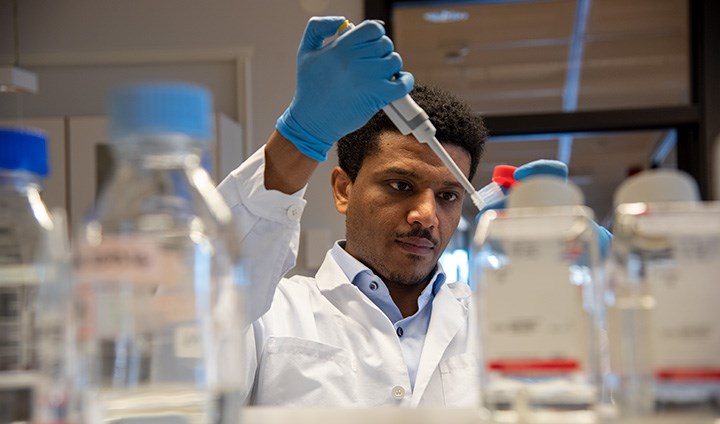Investigates the role of cells in the development of heart diseases

High blood pressure and diabetes damage cells in our blood vessels, which can lead to heart attack and stroke. Can the blocking of two proteins prevent this? That is something the Örebro researcher Mulugeta Zegeye is intending to find out. For this, he has been granted SEK 2,3 million from the Knowledge Foundation.
Mulugeta Zegeye has received a grant called Prospekt from the Knowledge Foundation. This form of funding is geared at junior researchers to give them the experience of leading research early on in their careers.
“It is exciting and an honour to receive this grant. The grant offers me an opportunity to carry out and manage a 2-year research project, which is a vital springboard for my future career in academia.
He has previously studied the marker of inflammation Interleukin-6, IL-6, and how it can function as a warning signs of heart attack.
“I have a keen interest in understanding the role of endothelial cells in the development of cardiovascular diseases. When these cells lose their normal function – it is one of the earliest steps towards atherosclerosis,” says Mulugeta Zegeye.
Endothelial cells line the inner wall of blood vessels and inhibit inflammation. They form an interface and serve as a barrier between tissue and the blood. When this barrier loses its function, fatty deposits and inflammatory cells collect in the vessels, leading to atherosclerosis, or in the worst case – heart attack or stroke.
Lose their function
The two proteins PDGF-R and MMP-9 are affected by, for example, diabetes and high blood pressure and in turn, they cause the endothelial cells to change and lose their function. Mulugeta Zegeye is intending to investigate whether this can be avoided by blocking these proteins.
“Understanding in detail the link between risk factors, endothelial dysfunction and cardiovascular diseases is a promising process, which can lead to new therapies,” says Mulugeta Zegeye.
The research is performed in several steps. First, studies are conducted at the molecular level in the lab. Mulugeta Zegeye will examine how the proteins cause the endothelial cells to change. Not only does this change remove the protective barrier in the vessels, it also aggravates the inflammation.
The world's biggest killer
Mulugeta Zegeye is conducting experiments to see if this change can be prevented by blocking the proteins.
“The lab experiments lay the foundation for further studies later on, which in turn will hopefully lead to new drugs,” he says.
Cardiovascular disease is today the world’s biggest killer, responsible for almost every third death globally. There are a number of known factors that increase the risk of cardiovascular disease, for example, overweight, diabetes, high blood pressure and smoking. Often, the heart is not directly affected, but the risk factors have various indirect effects – as in this case.
The project is undertaken in collaboration with Thermo Fisher Scientific and Affibody.
Text: Linda Harradine
Photo: Jesper Mattsson
Translation: Charlotta Hambre-Knight
